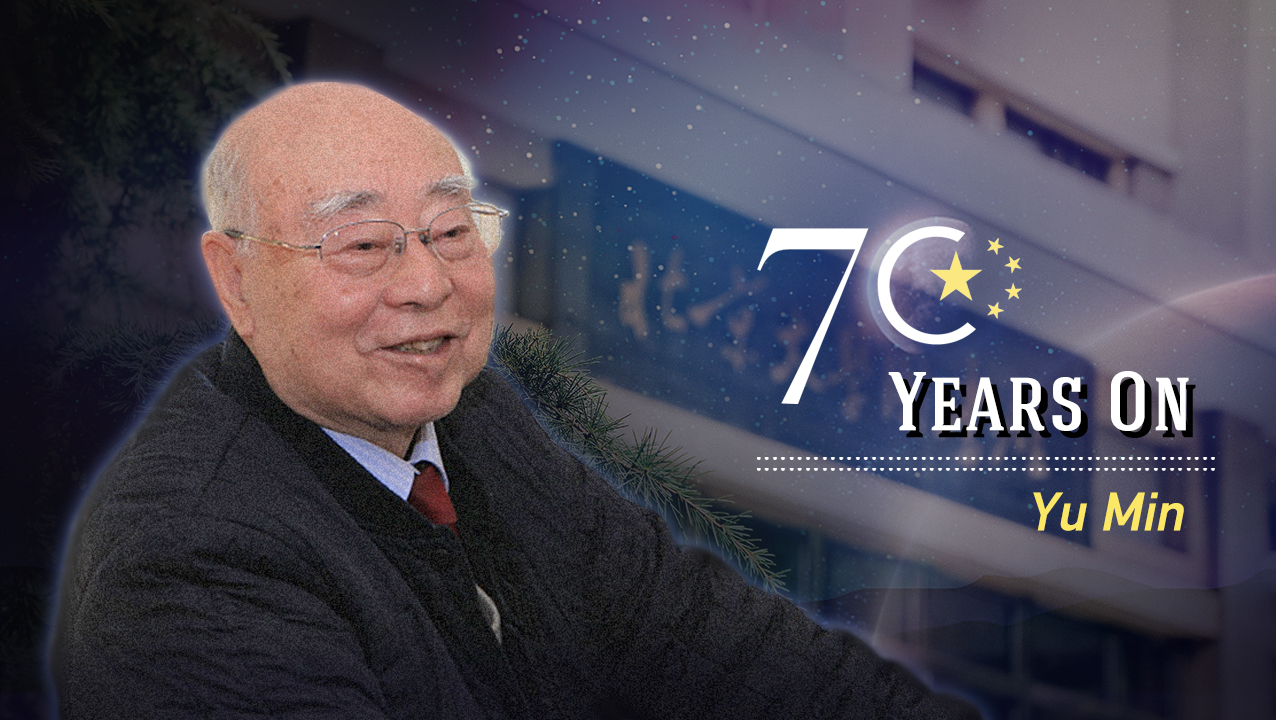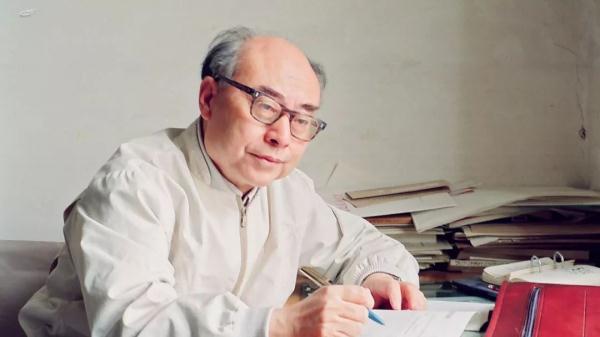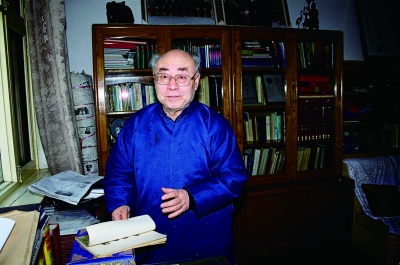[70 years on] Yu Min: The father of China’s hydrogen bomb
Sep 29, 2019
Editor’s Note: This story is part of a series of articles celebrating the 70th anniversary of the founding of the People’s Republic of China. Each article shines the spotlight on one PKUer who has made remarkable contributions to China’s recent development, highlighting not only the importance of their individual accomplishments, but also the significant impact Peking University has had on China’s development over the past 70 years.
Peking University, Sept. 29, 2019: Yu Min dedicated his life to protecting China through studying hydrogen bombs and nuclear weapons. Today, he is known as a national hero and the “Pioneer of China’s Reform.” He has been honoured with countless scientific awards including the “Two Bombs, One Satellite Achievement Medal.” Although he is widely celebrated today, Yu Min worked anonymously for 28 years in order to conduct classified research. Despite his rising prominence, many of his contributions to China remain undisclosed for security reasons. In January 2019 Yu Min passed away, leaving a legacy of patriotism and a country grateful for his many contributions.
 Yu Min
Yu Min
Yu Min’s bond with Peking University
Yu Min enjoyed a special bond with Peking University where he completed both his undergraduate and graduate studies. In 1944, Yu Min was admitted to Peking University’s School of Engineering. In 1946, he transferred to the School of Science to study physics decided to pursue a major in theoretical physics. In 1949, he graduated with his undergraduate diploma as part of the first cohort of graduates after the founding of New China in 1949. Yu Min continued his studies at Peking University and, under the guidance of Professor Zhang Zongxi and Professor Hu Ning, earned his postgraduate diploma with honours in 1951. He then joined the Institute of Modern Physics of the Chinese Academy of Sciences (now known as “The China Institute of Atomic Energy”) to research atomic nuclear theory.
"I don’t have any other choice"
After graduating from Peking University, Yu Min continued his research on nuclear theory. In January 1961, however, Qian Sanqiang, an influential Chinese nuclear physicist, proposed that Yu Min join his team as the deputy leader of the “light nuclear theory group.” At first, Yu Min was hesitant to leave his work because he preferred to do basic theoretical research and thought that he was not ready to work on such a large-scale project. Moreover, his research on nuclear theory was at a critical stage and he believed that he was close to making key breakthroughs.
Yu Min eventually accepted the offer, however, and left his theoretical research to lead the team conducting foundational research necessary to develop a hydrogen bomb. For Yu Min, a key factor in his decision were traumatic childhood memories of Japanese aggression. He was born on August 16, 1926 in Lutai Town, Ninghe District and grew up during the war of resistance against the Japanese. As a child, he witnessed the humiliation and suffering inflicted on his country. As an adult, those memories pushed him to serve his country and work on China’s military capabilities.
At the end of 1960, under the direction of Qian Sanqiang, the team began the theoretical explorations necessary to develop a hydrogen bomb. Yu Min abandoned his basic research and began focusing his work on heavy duty nuclear weapons. Due to the highly confidential nature of this research, his name and identity were kept secret.
 Yu Min
Yu Min
Painstaking efforts put into high levels of confidential work
Once he joined to bomb project, Yu Min led the hydrogen bomb pre-research team composed of more than 30 young researchers. After four years of painstaking effort, Yu Min’s team had solved many basic research problems, compiled calculation procedures, and successfully developed preliminary models.
On December 28, 1966, they saw some of the results of their work in action when China successfully tested a precursor to the hydrogen bomb. On June 17, 1967, China successfully tested a full-power hydrogen bomb in an air-drop explosion test. Although Yu Min did not witness the test, he was waiting by the phone in Beijing to hear the results. When the news of the victory came, Yu Min remained calm and simply told everyone to go back to sleep and get a good night’s rest. Just 32 months after its first nuclear test, China had a hydrogen bomb.
After the successfully testing the hydrogen bomb, Yu Min continued to lead the team researching nuclear weapons. He continued to make important contributions to China's nuclear weapons program and, more broadly, the country’s national defence.
Yu Min’s work led to the breakthroughs in the development of China’s hydrogen bombs. He put forward comprehensive theories and new knowledge about the hydrogen bomb that solved a series of previously unresolved problems. As a result of his work, China’s nuclear weapons program was internationally competitive.
Yu Min’s recent achievements
After his role in the development of China’s nuclear weapons became public, Yu Min received several honours and awards. He won the 2014 National Science and Technology Award and was paid a visit by a member of the Standing Committee of the Political Bureau of the CPC Central Committee on the behalf of General Secretary Xi Jinping and the Party Central Committee to extend him their sincere greetings.
On December 18, 2018, at the celebration of the 40th anniversary of reform and opening up, Yu Min was ranked first among 100 recipients of the title of "Pioneer of Reform.” The same year, the State Council granted him the title “The most important promoter of Chinese reform and the development of national defence in science and technology.” Yu Min was also awarded with the Two bombs, One satellite award, the National May 1st Labour Medal, the National Dedication Model, the Outstanding Scientist Award, and the National Science and Technology Award, the highest science and technology award.
On August 28, 2019 the People’s Daily published a news article celebrating the achievements of Yu Min and other role models who have been nominated for the Medal of the Republic and other national honorary titles. These awards are China’s highest honour given in recognition of significant contributions made to the development of China. They were awarded as part of celebrations commemorating the 70th anniversary of the founding of the PRC.
 Yu Min
Yu Min
“Father” of the hydrogen bomb
When Yu Min passed away on January 16th 2019 at the age of 93, China lost one of its most important heroes.
Yu Min always kept the inner peace in him, but was not afraid to share his conscience. During the Cultural Revolution, there were rumours spread about him. He insisted on speaking the truth even though telling lies would have been easier. Yu Min once explained that although lies might help him escape a difficult situation momentarily, dishonestly would not withstand the test of time and history.
Despite his fame and great success, Yu Min is a humble leader. When the state awarded him the “Two Bombs, One Satellite Achievement” medal, Yu Min was quick to point out that his success was the result of the team’s collective effort. When people gave him the title of "the father of hydrogen bombs", he turned it down, explaining that the development of nuclear weapons was nationwide effort. Yu Min insisted success was the result of a multi-disciplinary team and that his contributions were only one part of the work that drew on disciplines including science, technology and engineering. As he explained, it would not be scientific to say that he is the father of the hydrogen bomb. Yu Min lived most of his life as an "unknown hero". His talent, hard work, and contributions have now been recognized by the entire nation. His perseverance led to the successful test explosion for China’s first hydrogen bomb, enabled China to benefit from nuclear deterrence, and improved her military capabilities.
Despite his dislike of titles, in our hearts, Yu Min is without a doubt the father of China’s hydrogen bomb.
Written by: June Tan Rui Min
Edited by: Erin Dunne
Photo credit to: PKU News


